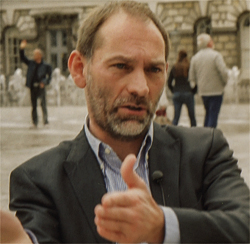Home rule
I have always suspected that the main reason Britain didn't join the euro was the suggestion that the Queen's head might not be allowed on the banknotes. Obviously the situation is more complicated that that, but Britain's hold-out status seems to me emblematic of Britain's underlying uncertainty about being "European" - that is, foreign. Nonetheless, assuming reinstalled prime minister David Cameron now holds the expected 2017 referendum on Britain's EU membership, it's hard to see the country voting to leave or the Conservatives wanting it to: business would surely be wildly opposed.
In the two weeks since the election we've been hearing a lot about "British values" (which may not include remaining a member of the EU) and how they should be legally reinforced: by squelching extremism and bringing back the "snooper's charter" Communications Data Bill. The Guardian's sarcastic take and New Statesman's more somber discussion do a fine job of outlining the gap between what Cameron and May mean and what everyone else means.
On Monday, ORG's London meetup group featured  Gregory Asmolov, an Israeli LSE PhD student researching ICT-enabled crowds in crisis situations. The question he sought to answer: how did Russia's democratic internet collapse? In 1994, when Runet was created, the early adopters were, as elsewhere, scientists, geeks, media, and creative people generally. Between 2000 and 2010, he said, LiveJournal became the "major public sphere online". In 2010, when the Berkman Center began surveying the Russian blogosphere, it looked very different from the traditional Russian media: it was a genuine alternative space for sharing ideas and was much more critical. It was also a space for public mobilization: when wildfires broke out around Moscow in 2010, tools and a crowdsourcing platform helped coordinate activities and compensated for the lack of response from traditional institutions. The government seemed friendly to these developments.
Gregory Asmolov, an Israeli LSE PhD student researching ICT-enabled crowds in crisis situations. The question he sought to answer: how did Russia's democratic internet collapse? In 1994, when Runet was created, the early adopters were, as elsewhere, scientists, geeks, media, and creative people generally. Between 2000 and 2010, he said, LiveJournal became the "major public sphere online". In 2010, when the Berkman Center began surveying the Russian blogosphere, it looked very different from the traditional Russian media: it was a genuine alternative space for sharing ideas and was much more critical. It was also a space for public mobilization: when wildfires broke out around Moscow in 2010, tools and a crowdsourcing platform helped coordinate activities and compensated for the lack of response from traditional institutions. The government seemed friendly to these developments.
Change began in March 2012 with the election of Vladimir Putin, when the internet's bottom-up protests around that election were notably more successful than the top-down government attempts to mobilize crowd support for Putin. In the years since, a number of significant changes have occurred:
- The government has imposed control over large internet companies such as the Yandex search engine. Some company leaders had to leave: the head of VKontakte, Russia's equivalent of Facebook, was pressured to shut down opposition groups and rather than abandon his commitment to freedom of speech he sold his stake.
- The government began discussing implementing a "kill switch".
- State institutions built a greater presence online.
- A new legal regulatory environment began to take shape, with new proposals almost every day. Eighty-seven such initiatives were approved by the Russian parliament in 2014 alone.
- The Russian Association of Internet Users, set up in 2013, cites 2,591 cases of limitations of Internet freedoms.
These regulations focus on four areas, run by four different government departments: extremism or anything that challenges political stability; anything suicide-related; drugs and drug-related issues; child protection. The latter category enables censoring anything LGBT-related and promotes "family values". All four categories are flexible enough to encompass pretty much anything the government would like to close. On top of that, individual regions can introduce their own laws, and it is these that generate most of the "really ridiculous" stories about the way the law has been imposed.
Asmolov believes the key factor is general public support: "The majority of the population supports any type of internet regulation." A few weeks ago, when there was a new set of wildfires, "There was almost no mobilization. There is fear now."
Given the expectations surrounding next week's Queen's speech - a revival of the Communications Data Bill and new extremism legislation - in the discussion that followed, some wondered about the potential for the same kind of change to happen in the UK given today's widespread blocking. The general feeling was optimistic: there is still public debate, considerable support for freedom of speech, and the culture and traditions are quite different. Let's hope they stay that way.
No such issues were raised at yesterday's Internet Policy Forum, run by Britain's domain name registry, Nominet. At this event, you would never have guessed that big issues surrounding the internet in Britain include censorship and surveillance. The panel on privacy talked mainly about corporate use of personal data; the speakers on digital citizenship focused on the use of digital media in the recent election, the Government Digital Service's efforts to remake British government IT, and Speaker John Bercow's report on digital democracy.
The most interesting takeaway came from  Andy Williamson, the 2011 founder of Democrati.se, who named the big winners and losers in the last election. Not the politics, the technology. On the social media so much followed by the mainstream media, as recent research has also showed, people were mostly talking to other people in their bubbles. The big winner for getting elected, traditional canvassing, doorstep meetings, and face-to-face interactions. The other big winner: gov.uk, which registered 450,000 people on the last day of eligibility, people who previously would have to present themselves in person or be disenfranchised. There's a British value.
Andy Williamson, the 2011 founder of Democrati.se, who named the big winners and losers in the last election. Not the politics, the technology. On the social media so much followed by the mainstream media, as recent research has also showed, people were mostly talking to other people in their bubbles. The big winner for getting elected, traditional canvassing, doorstep meetings, and face-to-face interactions. The other big winner: gov.uk, which registered 450,000 people on the last day of eligibility, people who previously would have to present themselves in person or be disenfranchised. There's a British value.
Wendy M. Grossman is the 2013 winner of the Enigma Award. Her Web site has an extensive archive of her books, articles, and music, and an archive of earlier columns in this series. Stories about the border wars between cyberspace and real life are posted occasionally during the week at the net.wars Pinboard - or follow on Twitter.